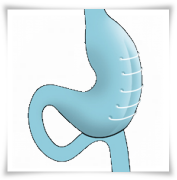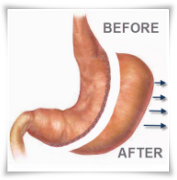Gastric Sleeve
The Gastric Sleeve is a new type of weight loss surgery that bariatric surgeons use to help overweight and morbidly obese patients achieve their ideal weight.
The Gastric Sleeve goes by various names, like sleeve gastrectomy vertical sleeve gastrectomy (VSG), tube gastrectomy, gastric sleeve resection, and laparoscopic sleeve gastrectomy, but the no matter which name you use it is the same procedure.
On this site, we will provide information about the Gastric Sleeve, what is involved, how it works, and we will also compare it to other forms of bariatric surgery. This website will give you info on the cost, factors that affect the cost, and we will also discuss options on how to make the surgery affordable.
Click here to get more Facts On Gastric Sleeve Surgery.
What Is The Sleeve?
The gastric sleeve basically involves cutting away 60% to 80% of your stomach. The part that is removed is the Greater Curvature. The stomach that remains is formed in the shape of a tube, or a ‘sleeve’, this is where the gastric sleeve procedure gets its name from.
How Much Does This Weight Loss Surgery Cost?
On average, the gastric sleeve will cost approximately $15,500, but remember that everyone is different, and therefore have different needs. With this in mind, you can expect the cost of a gastric surgery to range between $10,000 and $20,000.
If you have health insurance or coverage through your employer the gastric sleeve cost may be covered. Many bariatric surgeons offer payment plans that allow you to break up the entire cost into smaller, more manageable payments. In some cases, if you qualify, you can even find entities that offer free gastric sleeve surgery.
Why Should I Get One?
The bottom line is: it pays to be healthy. If you remain overweight or obese you will most likely develop some health issues related to your weight. These health problems can include things like sleep apnea, arthritis, heart problems, and type II diabetes just to name a few. The costs for medication, medical tests, monitoring, and everything else you need to do to keep those health issues in check will far exceed the cost of gastric sleeve surgery.
Today, an obese person on average will spend $1,600 or more every year on medication and treatments to keep their health in check. That’s $1,600 EACH YEAR! If you spend that much every year for 20 years, that’s more than $30,000, which more than the most expensive gastric sleeve procedure! Not to mention the fact that you will still suffer from the symptoms of those health issues, you will still be unhealthy, and will be at a higher risk of death as you get older.
No matter how you look it, the benefits of gastric sleeve surgery far outweigh the cost of surgery.
How Does it Work?
The sleeve is a Restrictive Method of bariatric surgery, meaning the amount of food you eat is restricted. A large portion of your stomach is removed, and its capacity is reduced. This means that it can no longer hold the 3 pints of food that it used to, after gastric sleeve surgery it can only hold about 1 to 2 ounces of food. The reduced amount of food means that less nutrients and calories will be absorbed by your body, hence, weight loss occurs.
How Is the VSG Surgery Performed?
 There are two ways to complete gastric surgery: Open Surgery and Laproscopic Surgery.
There are two ways to complete gastric surgery: Open Surgery and Laproscopic Surgery.
Open Surgery means you are literally opened up, which increases the risk of infection and bleeding, this is not the preferred method. Laproscopic surgery is what the majority of bariatric surgeons prefer for gastric sleeve surgery.
Laproscopic Surgery means that the surgeon will make a few tiny incisions around your abdomen as opposed to one very large incision. A laproscopic camera is used, it is a tiny camera attached the end of a very slim tube. The surgeon is able to see everything through the camera. Laproscopic tools are inserted through the tiny incisions, and the surgeon is able to perform the surgery accurately and precisely.
The patient will be put under general anesthesia. Once unconscious, the surgeon will make a few incisions which allow the bariatric surgeon to manipulate very small medical instruments to perform the weight loss surgery. The greater curvature of the stomach is cut away and removed, and the remaining stomach is sealed up using sutures and surgical staples. The surgeon will close up the tiny incisions and the surgery is complete.
The patient will be monitored for the next 48 hours to ensure there are no complications, and that the recovery process is well under way. After 2 to 3 days, the patient is released from the hospital and sent home to recover for another 14 days. During the recovery period, as with any other surgery, it advised to avoid any strenuous activity such as lifting heavy objects, or working out as this may open up the wounds and cause complications.
What Can I Eat After Surgery?
Immediately following the gastric sleeve procedure, you will be on a liquid diet. The stomach has been operated on and is still fragile, so you have to take it easy on your stomach for the first bit to allow it to heal. After 2 weeks you may progress to soft foods and pureed foods. The stage following the soft foods is the solid foods stage, which is roughly 4 to 8 weeks after surgery.
Listen to your bariatric surgeon and stick to the guidelines they give you. They may recommend that you see a dietician to help you plan your meals, discuss what you should and should not eat, and help to develop healthy eating habits.
Be Ready For A Lifestyle Change
The sleeve will reduce the size of your stomach, but it can stretch over time. To avoid this, you must limit the amount of food you eat. This requires a change to your eating habits, and a change in the food that you eat. Remember, you can only eat so much food now, so you should make sure you provide your body with the nutrients that it needs to stay healthy.
You must be committed to this lifestyle change to ensure that you lose the weight and keep it off. A couple suggestions would be to have a support system in place before undergoing gastric sleeve surgery. Speak with your family and they can help you to eat right, and help support you through all the changes. You can also join support groups to help provide encouragement along your journey. Once you have healed (and based on your doctor’s recommendation) you should also begin to get regular exercise to help you stay healthy, fit, and to help keep the excess weight off.
The sleeve is a great way to lose excess weight and win the battle against obesity. Being overweight or obese can lead to a number of health issues that will affect you for life, but the gastric sleeve can help you live a longer, healthier and happier life. For information about the procedure and its benefits, you can speak with your doctor or bariatric surgeon, or you can find more information on this website about all the weight loss surgery options available today.

